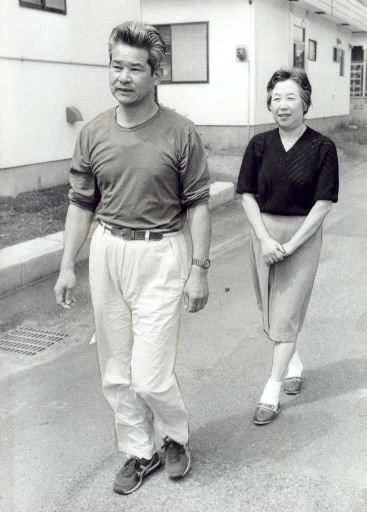The "Moral Adoption" of Hiroshima’s A-bomb Orphans, Part II [2]
Feb. 1, 2009
Family is a precious thing
by Akira Tashiro and Masami Nishimoto, Special Reporters
This series of articles continues the story of the "moral adoption" of children in Hiroshima by American citizens. It was originally published in July 1988. The exact spelling of some names could not be confirmed.
Takahiro Yano, 52, is now a resident of the city of Sapporo in Hokkaido, Japan. He lost his entire family in the atomic bombing of Hiroshima: his father Kaoru, 40 at the time; his mother Tae, 35; his sisters Michiko, 13, Sakae, 12, Tetsuko, 7, Ritsuko, 4, and Sachiko, 3; and his brother Gunji, 1.
Mr. Yano was born the second son of eight children in the former Nakajima Shinmachi district of Hiroshima, the hypocenter of the atomic bombing. [The first son died earlier.]
When the bomb exploded, his family was living near Hiroshima City Hall. They had been forced to move from the Nakajima Shinmachi area after an order came to dismantle houses there to create a fire lane. His father and oldest sister died instantly in the blast. Though his mother was injured, she took the remaining five children and came to collect Mr. Yano, who had been evacuated to Chukonji Temple in the northern part of Hiroshima Prefecture before the bombing. His mother told him, "You are the head of our family now. Please be a man." Looking back, Mr. Yano said, "I still can't forget that moment. It was August 22."
Mr. Yano, who was just nine years old at the time, led them to his mother's parents' home on Shimokamagari Island in the Seto Inland Sea. But his mother, his older sister, and his younger brother passed away one after the other. Finally, his three-year-old sister died as he knelt by her bed on the morning of an autumn festival. "At that point, I couldn't even feel sadness anymore," Mr. Yano said, recalling how he felt when he became all alone in the world.
Spotting a news photo of the Peace Restoration Festival held in 1946, he saw children of the Hiroshima War Orphans Foster Home attending the event. In the picture he found a friend he had played with in his early childhood. Thinking he could find friends there, he begged those working at the village office to undertake the necessary procedures and he left the island with only one bag in his hand.
Mr. Yano now serves as a third lieutenant in the reconnaissance troop in the 11th Division of the Japan Ground Self Defense Force (SDF). His memories of his "American family" have already faded. The copies of letters exchanged between Mr. Yano and his foster parents, which were brought to him for this interview, rekindled his fading memories of "those days."
“Yes, they were furniture dealers in North Carolina. Their last name was Wall. They were a husband and wife named Matt and Elizabeth...” His wife Eiko, 52, sitting by his side, peeked at the copies of the letters and said, "Oh, you wrote about our marriage."
Mr. Yano, who liked to collect insects and go on hikes, addressed them frankly as "Father" and "Mother" in his letters. "I was so happy to have someone who cared about me," Mr. Yano recalled. When he received such gifts as a sweater, a ball and a camera, these presents provided a sense of "family" and "home" in his mind.
After graduating from junior high school, Mr. Yano spent three years alone in Fukuoka Prefecture, working for a rapeseed oil factory. "People asked me about my family in the workplace," he said. "But when I answered the question truthfully, they pitied me." This experience frustrated him: "When I was looking for a place where I wouldn't have to worry about my past, I came upon the SDF." In 1954, Mr. Yano joined the Self Defense Forces as a member of the inaugural class.
When he joined the SDF, he purposely left the section about his family blank in completing his personal information. At that point, he felt an even keener loneliness. Even if he should write a letter to his American family, he had no one around to translate it for him. In his second year at the SDF, he fell in love with a woman his age working in the Welfare Division.
"People teased me, calling the letters my regular mail service," said Eiko. Instead of writing to his American family, which involved a language barrier, Mr. Yano exchanged letters twice a week for four years with Eiko, who had been transferred to the city of Beppu in Otia Prefecture and moved back in with her parents. The couple were married in 1960 and have two children, Hiromi, 26, and Kinya, 23.
As a result of a change in his assignment, they moved to Hokkaido, originally intending to stay for about five years. But 22 years have passed since then. They have never lived in an official SDF residence while in Hokkaido as "I don't want to worry about our neighbors, I just want to treasure my time with my family," explained Mr. Yano. "We can live without things, but we can't live without the people we love, can we?" he added, and Eiko nodded in agreement.
As if remembering something, Mr. Yano stopped and brought out an old photo album. When he opened the album's red cover, his American family, the Walls, were smiling up from the page. "Above all, it's just nice to be with family," he said.
(Originally published on July 25, 1988)








